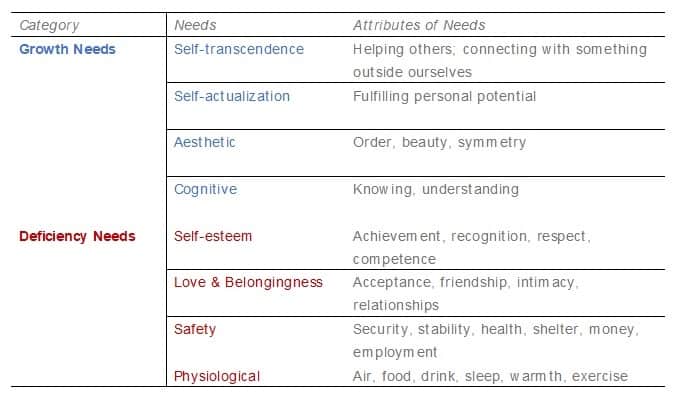Maslow and Self-Transcendence
14 July 2021
Probably the least clear of Maslow’s needs is self-transcendence, the final growth need in his hierarchy. The description of this state is “Helping others, connecting with something outside ourselves” (Atkinson & Tomley, 2012, p. 139). G-d is often referenced as that something higher than us.
There is a parallel between wanting to transcend (“to rise above or across”) and wanting to escape. The parallel is in absence from one state and presence in another. Music lovers rise above present inconvenience when immersed in music they cherish. Similarly, psychoactive drug users rise above those same obstacles when using, particularly in early use. The difference is that the music lover finishes her listening and moves on to her next right thing. The person using drugs returns in a diminished, challenged, and ashamed state with the next right thing looking even more daunting than before she used alcohol, cocaine, oxy...

Table 1, Maslow’s Hierarchy of Needs (Atkinson and Tomley, 2012)
If we buy into Maslow’s hierarchy—and it does cover a great deal of bio-psycho-social-spiritual conditions of human life—the difference, between the music lover’s experience and the drug user’s experience, is analogous to the difference between transcendence and deficiency. Recall, that the lower half of Maslow’s hierarchy consists of needs that must be met before a person can begin higher types of growth. In plainer terms, I suspect a healthy relationship with one’s day-to-day affairs (deficiency needs) is necessary before one begins work on his growth needs.
In a chapter entitled Health as Transcendence of Environment, Maslow (1968, p. 179) wrote that “There is not only an orientation to the outer but also to the inner.” Placed in context, he was arguing that worldly success may be the unchallenged standard of human efficacy, but it was not his. In other words, your ability to get on in the modern world is not enough to facilitate becoming a fully actualized human being.
It sounds a bit mystical or other-worldly, but moments of self-transcendence can happen from childhood onward. When a young girl sits in an unfamiliar sanctuary of a church, whose message she does not understand, and hears the music of Buxtehude coming through the organ pipes so powerfully that the building threatens to shake to pieces, she is no longer thinking about her present worries. Her focus is the music, the power, the sublime confluence of that soaring space and epic sound—in those moments, she has transcended self.
Yet to be that actualized person, capable of attaining a state self-transcendence, seems something a little more. I believe you must be at peace with the world but attuned to your own understandings. I believe it is implicit within Maslow’s hierarchy that one’s focus moves, throughout the growth stages, away from introspection and self-awareness toward extrospection (outward & forward looking). But, logically or otherwise, Maslow resisted this notion.
…we must save the differentiation between self and not-self in order to understand the fully matured person (authentic, self-actualizing, individuated, productive, healthy) ... In practically all of them, I found a rather calm, good-humoured rejection of the stupidities and imperfections of the culture with greater or lesser effort at improving it... They also showed a surprising amount of detachment from people in general and a strong liking for privacy, even a need for it. For these and other reasons they may be called autonomous i.e., ruled by the laws of their own character rather than by the roles of society... (Maslow, 1968, pp. 180-181)
So that’s where we leave Maslow’s hierarchy, with only a vague understanding of self-transcendence, a state and concept I suspect has strong correlations with Aristotle’s ultimate destination of the contemplative life.
Dan Chalykoff is working toward an M.Ed. in Counselling Psychology and accreditation in Professional Addiction Studies. He writes these blogs to increase (and share) his own evolving understandings of ideas. Since 2017, he has facilitated two voluntary weekly group meetings of SMART Recovery.
Comments